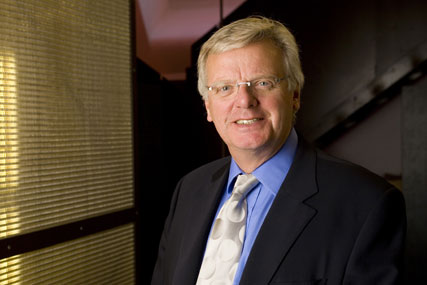
Such a move would scupper ITV's leadership succession plan, announced last week, in which Grade relinquishes his executive chairman role by the end of the year and becomes non-executive chairman once a new chief executive is appointed.
Many aspects of Grade's tenure are deemed successful by ITV backers and the TV industry in general. Top of the list is Grade's role in reducing ITV's regulatory burden, particularly in persuading the Government to review contract rights renewal (CRR).
ITV declined to comment officially, although insiders argue its operational performance has been strong relative to the industry. In 2008, for example, while ITV's net ad revenue was down 4%, the entire UK TV ad market declined 5%.
However, many investors view the Grade years as negative. According to one: "Recession or no recession, ITV was always in a bad place because its programming is not good enough."
A former senior ITV executive said: "His whole content-led strategy was phoney from the start. Just how many of ITV's popular shows are Grade ones - not many."
Despite the disquiet, news of Grade's exit came as a surprise. One analyst said: "Some shareholders rebelled when ITV raised the idea of a possible cash call from shareholders."
Looking at the next few months, some analysts are concerned ITV will be stuck in limbo while it seeks a new chief executive and Grade is occupied with, in ITV's words last week, "important regulatory decisions" such as the Digital Britain report and CRR review. One analyst warned: "I am concerned about ITV being a lame duck."
Those who want Grade to leave are concerned he could still play a dominant role after the new chief executive arrives. A senior TV executive said: "For someone to come in and take the big decisions - many of which run counter to Grade's thinking, such as the splitting of its broadcast and production businesses - could be hard if he is in the background."
ITV's chief operating officer John Cresswell is favourite to land the top job. But one analyst warned: "He is part of the old school and that won't be enough for some shareholders."
Whoever ITV chooses faces a mammoth task. Another former ITV executive warns: "Plenty of smart people can run it competently, but none has a magic wand to fix the issues."
What does Grade need to do before he leaves?
- A cash call remains possible, although ITV insists it has "adequate liquidity"
- Raise as much as possible through the sale of assets such as Friends Reunited and Freeview landlord SDN
- Steer ITV through a maze of regulatory reviews, chiefly ensuring ITV is freed from CRR or, at least, that the mechanism is significantly relaxed
- The Digital Britain report will map out the future shape of commercial public service broadcasting. Grade will have to ensure ITV is not left behind as Channel 4 and Five potentially play a bigger role in the UK TV landscape
To do list in next chief executive's in-tray
- Turn ITV into an internationally focused media group, adopting the model used by its European peers such as RTL Group
- "There has been too much focus on the short term," says a former Hollywood studio executive. "ITV now needs to look at the long-term position of its brand."
- Find a buyer or partner. However, as one analyst warned: "No buyer would want to deal with the complexities of the UK media market in terms of regulation."
- Become leaner. "ITV can still take a lot of costs out of its business - by investing in the right technology," suggests a former ITV executive
- "ITV needs a more convincing digital strategy and to leverage its library. VoD is one way, but what else?" asks a senior TV executive
Who will be ITV's next chief executive? Analysts' favourites emerge
Andy Duncan, chief executive, Channel 4
"Would relish another challenge after securing Channel 4's future," said one analyst.
Malcolm Wall, former chief executive, Virgin Media's content arm
Many years' experience at ITV and former Five owner UBM. Many analysts' favourite.
Michael Jackson, former chief executive, Channel 4
Just appointed non-executive director at STV. Strong US and digital background make him a front runner.
Dawn Airey, chief executive and chairman, Five
Top-level experience at Sky, ITV and Five, although would have to work with Grade again.
John Cresswell, chief operating officer, ITV
The favourite, should ITV look for an internal hire. "The safe pair of hands ITV needs," said one analyst.
Rupert Howell, MD, brand & commercial, ITV
"Grade's boy," according to a former ITV executive. But others warned: "He's not liked internally."
Grade's tenure: Key events during his time at ITV helm
Nov 2006 ITV hires Grade, then BBC chairman, as executive chairman, replacing chief executive Charles Allen and chairman Peter Burt
Sept 2007 Grade details his content-led strategy for the broadcaster, led by a doubling of ITV's global content revenue by 2012 to £1.2bn
Oct 2007 ITV fined £5.7m for misleading viewers over phone-ins on shows such as Ant & Dec's Saturday Night Takeaway
Apr 2008 Blow to content-led plan as global content chief Dawn Airey joins Five
Sept 2008 Grade unveils plans to axe 429 jobs from regional news departments
Oct 2008 Grade calls on Ofcom to ease ITV's PSB obligations
Jan 2009 Office of Fair Trading recommends contract rights renewal should be relaxed
Feb 2009 Online strategy blow as Project Kangaroo blocked from launch by Competition Commission
Mar 2009 Grade scraps his content-led turnaround strategy targets, arguing they are "no longer appropriate"



.jpg)
.jpeg)
